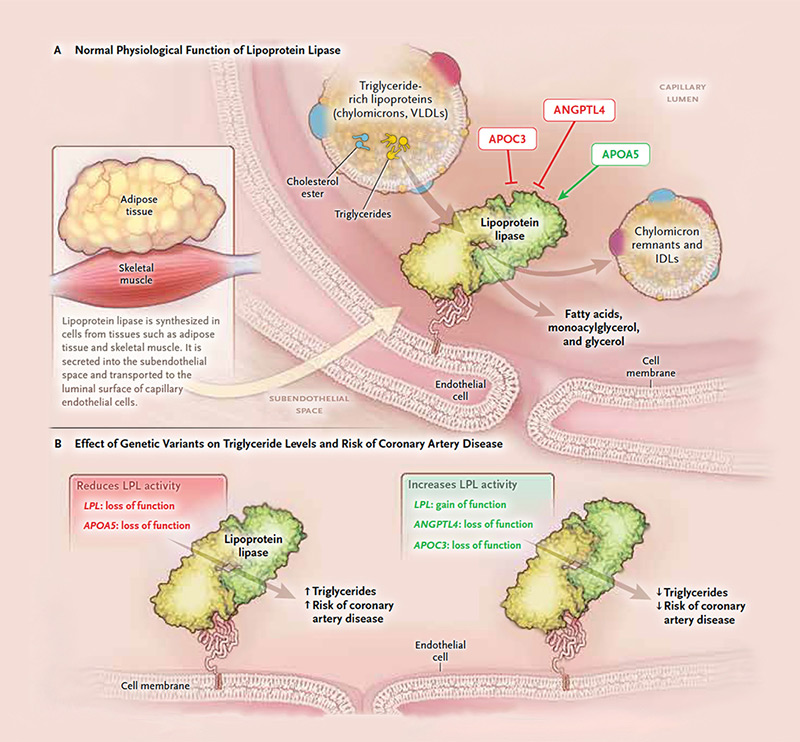
10th March 2016 Gene mutation lowers heart attack risk by 50% German researchers have identified a specific gene mutation in humans that provides a 50 percent lower risk of suffering a heart attack.
Worldwide, heart attacks are responsible for an estimated 7.3 million deaths each year, or about 13% of all deaths globally. They are the leading cause of death in high- or middle-income countries and second only to lower respiratory infections in lower-income countries. In the United States, someone has a heart attack every 34 seconds. This week, researchers have announced a significant finding that could lead to future treatments able to prevent heart attacks. An international team headed by cardiologist Prof. Heribert Schunkert, of the German Heart Centre at the Technical University of Munich (TUM), found that people with a specific gene mutation have a 50 percent lower risk of suffering a heart attack. If this gene were switched off with medications, it could greatly reduce the risk of coronary disease. "This discovery makes it considerably easier to develop new medications that simulate the effect of this mutation," explains Prof. Schunkert. "This gives follow-on research aiming at reducing heart attacks in the future a concrete goal." For the large-scale study, the scientists analysed 13,700 different genes from a pool of 200,000 participants – both heart attack patients and a group of healthy control persons. They were on the lookout for correlations between gene mutations and coronary artery disease. For a number of genes, researchers noticed a clear correlation, including the ANGPTL4 (angiopoietin-like 4) gene. In addition, subjects with the mutated ANGPTL4 gene had significantly lower triglyceride values in their blood. Triglycerides are the main constituent of body fat in humans and animals. "The blood fat triglyceride serves as an energy store for the body," explains Prof. Jeanette Erdmann, from the University of Lübeck, who collaborated on the work. "However, as with LDL cholesterol, elevated values lead to increased risk of cardiovascular disease. Low values, by contrast, lower the risk."
Until now, the significance of triglycerides for human health was underestimated, according to Prof. Schunkert: "For most patients, the focus still lies on cholesterol. A differentiation is always made between the healthy HDL and the harmful LDL cholesterol variants. However, in the mean time we know that the HDL values always run inversely proportional to those of the triglycerides and that HDL itself actually tends to behave in a neutral manner." "The triglycerides, on the other hand, are the second important blood fat, alongside the harmful LDL cholesterol. We published this in the Lancet two years ago. The only reason HDL blood values are still measured is because, together with HDL and triglyceride values, they can be used to derive LDL values, which cannot be measured directly." The current study now shows that the concentration of triglycerides in the blood is influenced not only by nutrition and predisposition, but also by the ANGPTL4 gene. "At the core of our data is the lipoprotein lipase (LPL) enzyme. It causes the decomposition of triglycerides in the blood," says Erdmann. Normally, ANGPTL4 hems the LPL enzyme, causing blood fat values to rise. The mutations identified by the researchers disable the function of this gene and thereby ensure that the triglyceride value drops significantly. "At the same time," says Erdmann, "we discovered that the body does not even need the ANGPTL4 gene and manages wonderfully without it. It seems to be superfluous." Shutting down the gene or inhibiting the LPL enzyme in another manner may ultimately protect against coronary disease. "Based on our results, medications now need to be developed to neutralise the effect of the ANGPTL4 gene, thereby reducing the risk of a heart attack," adds Prof. Schuinkert. "Other researchers have already done this successfully in animal tests. They drastically reduced the blood fat levels in monkeys that received a neutralising antibody against ANGPTL4. This feeds the hope that antibody preparations with a similar effect can soon be used successfully in humans." The study is published in the New England Journal of Medicine. ---
Comments »
|








